The Shed closure mirrors Scotland's nightclub demise
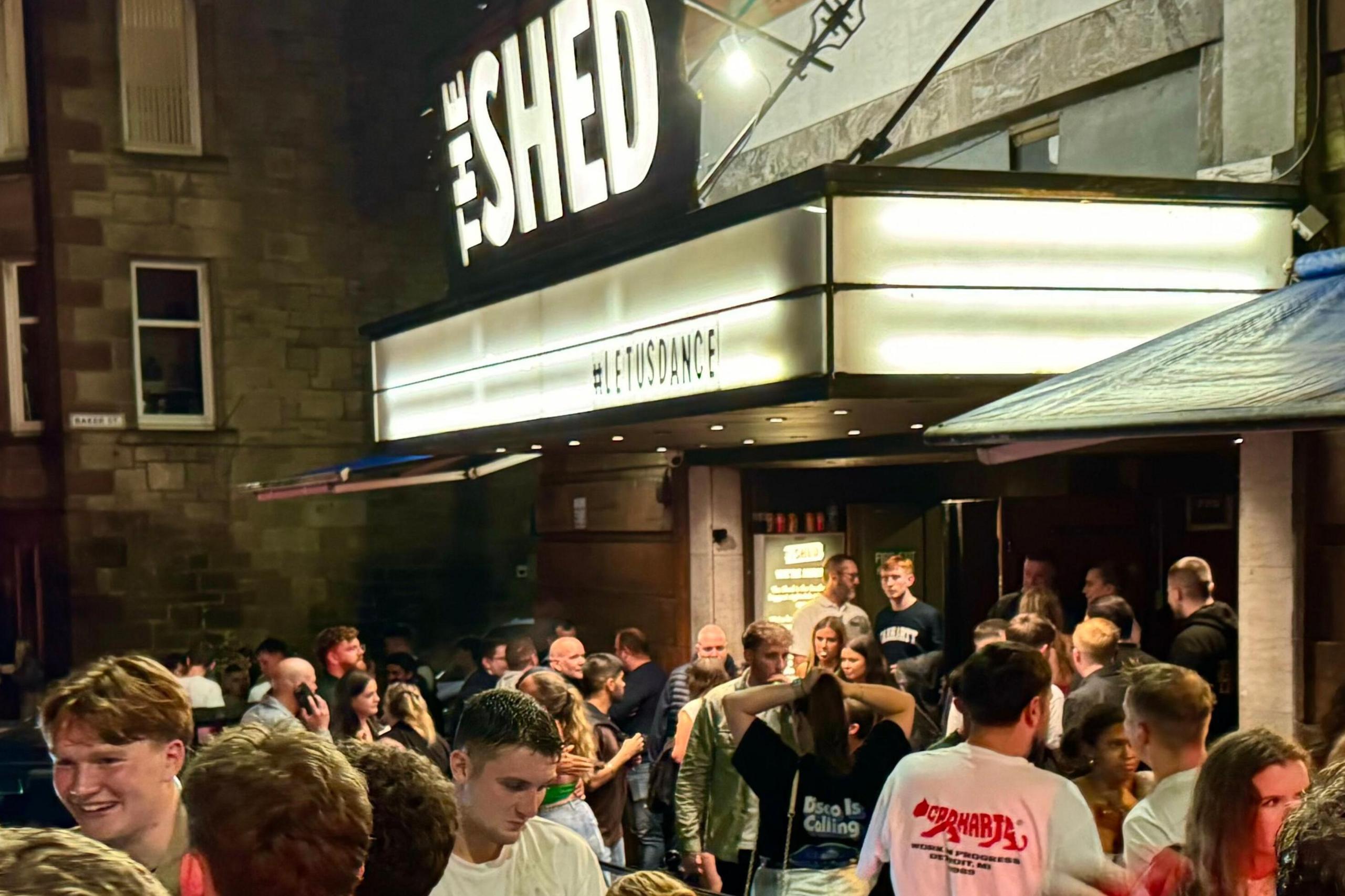
The Shed nightclub in Shawlands has been running for 26 years
- Published
“I’m not gonna lie, that was the best night ever!” shouts one young woman as the music fades and the crowds begin to pour from the front of The Shed nightclub.
People hug, sing and snap selfies to mark the moment.
“It was a perfect end to it” says Blake who’s 20, looking and sounding like he only left the dancefloor 10 seconds ago.
“26 years, I mean come on… even my mum and dad went to it before it was named The Shed.”
The final night on Saturday had been billed "Armasheddon" until another was tacked on last minute for the Sunday.
That was Christmas themed because they won’t get another chance now.
The dancefloor was full again as people wore Santa hats and sang the classics. Shots were drunk and the smoke machine belched out white clouds one last time.
Tickets for the last weekend were hard to come by. But the venue said people would be allowed in for free if they showed a Shed tattoo.
“Tattoo must be real and we will check it” read the promo. “Please tattoo responsibly” it added.
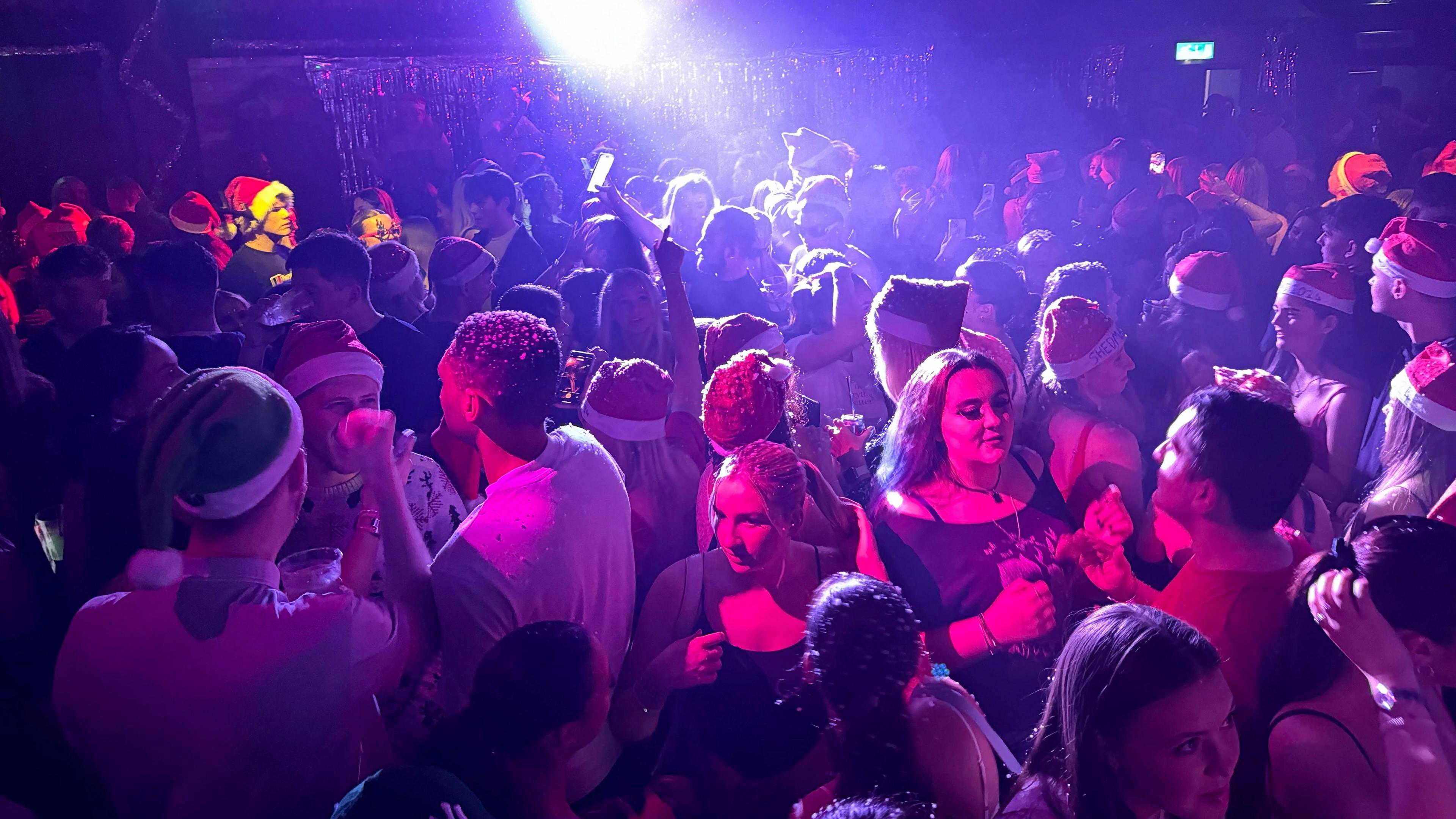
The last night of The Shed had a Christmas theme
This Glasgow institution has been shaking the foundations of Shawlands on the city’s southside for 26 years.
This was a club that once boasted a Monster Munch buffet, a Meatloaf tribute act and free entry if you turned up in your PJs (these things didn’t all happen on the same night).
Its demise is part of a bigger story.
The cheesy behemoths that helped define the nineties and noughties in Scotland - and across the UK - are now struggling, teetering like a worn-out raver in a taxi queue after one too many Aftershocks.
Figures from the Night-Time Industries Association (NTIA), shared with the BBC, show there are only 82 nightclubs left in Scotland now.
That is down from 125 venues in 2020, a drop of more than 30% in four years.
While some of those disappeared during the Covid lockdowns and restrictions, that doesn’t tell the whole story.
It costs far more to operate a nightclub than it used to and people have less spare cash to spend in them.
“It's pretty grim actually” says Mike Grieve, chairman of NTIA Scotland.
Change in generational behaviour
He says one of the really significant factors has been a stark change in generational behaviour post lockdown.
“What we noticed when we reopened after Covid was that the younger audience was very keen to get out and go to clubs and party," he says.
"But the slightly older audience has got used to sitting at home watching Netflix, ordering in a pizza and having a bottle of wine or whatever.
"And they never really came back.”
The night-time industries have a £10bn turnover across Scotland and account for 137,000 jobs.
But the owners of pubs, clubs and restaurants say they have seen a 30-40% increase in operating costs and a 10-15% downturn in trade in the past four years.
And 70% of them say it’s a challenging time for their businesses.
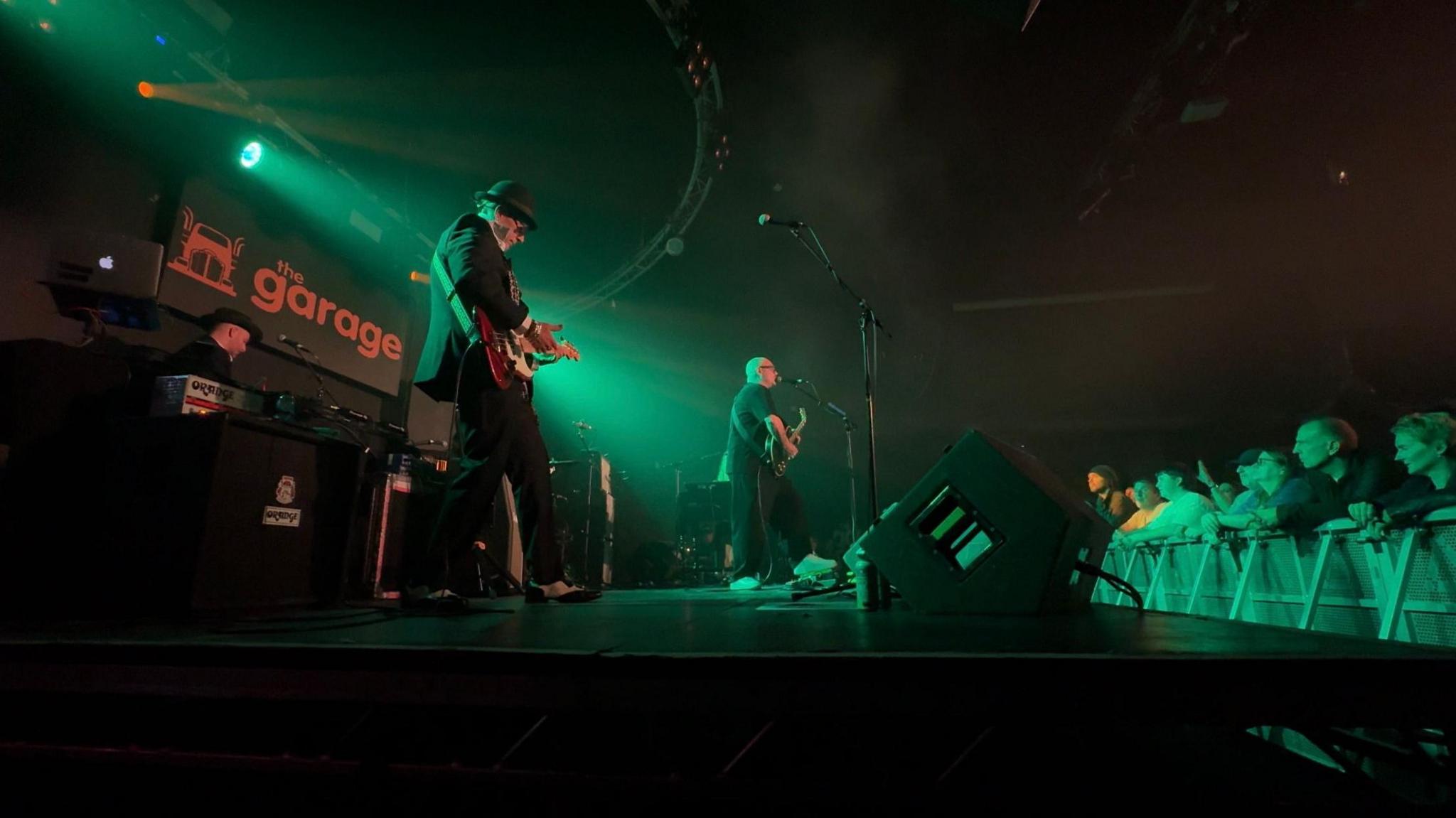
The Garage recently announced it was cutting back on the days it opens
Scotland’s largest nightclub, The Garage, recently announced it was cutting back on the days it is open.
Previously a 365-days-a-year venue it’s now just Thursdays, Fridays, and Saturdays.
As we walk up the stairs at The Garage, the names of hundreds of bands, big and small, are inscribed around us in white on a black background.
Founder Donald MacLeod reckons around five million pairs of feet climbed those stairs before us in the 30 years it has been open.
He is proud of that, but admits these are worrying times as he lists the challenges they currently face.
“Energy prices going through the roof, the cost of living crisis, interest rates going up.
"Just a litany of disasters which we’ve all had to cope with as well as we can.”
But he adds: "We’re still here. The Garage is still here, The Cathouse is still there, there are other clubs and venues that are still there but you know it’s getting harder by the day.”
The Garage dancefloor is packed this evening though.
'Visceral feeling'
Huey Morgan - former frontman of the Fun Lovin' Criminals - has made sure of that. The crowd - in their 30s, 40s and older - chant his name and someone shouts out “welcome home” to laughter.
He has a long affinity to this place and rounds off his set with their timeless track Scooby Snacks.
The soundbyte snatches of Tarantino movies puncturing the air, it’s pure nineties nostalgia.
This man has spent a lifetime DJing in clubs and playing music venues and he shares many of the concerns about their future.
Morgan told BBC Scotland News: "I think the importance of nightlife, or just stuff that is happening outside of your house is really important now with the advent of digital life.
"We can do all these things online and virtually, it’s good to have that visceral feeling of being in a group of people.
"So I think as far as it goes we’re gonna need more of it, I think the kids are calling it 'unique experiences'."
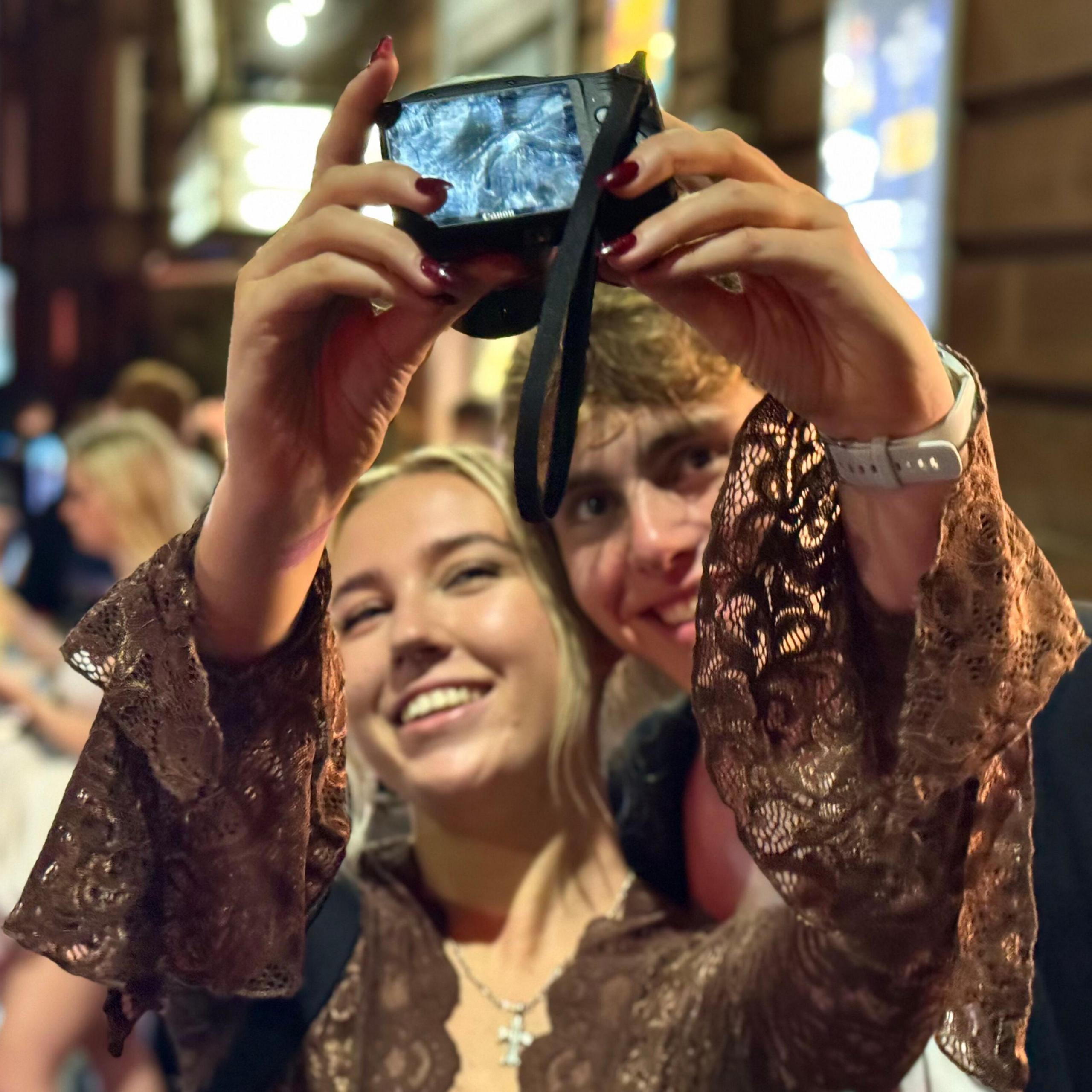
Some of those kids are outside across the road queuing for a different venue.
Unique experiences are important to them but cold hard cash is perhaps a bigger issue.
One tells me: "That’s why we’re here on Thursday. Because it’s student night and its cheap!"
Alongside money, infrastructure plays a crucial role.
A study from Glasgow Caledonian University into the value of the night-time economy in Scotland’s largest city laid bare the full range of challenges facing night-time venues in June this year.
It points out that in 2014 the sector was worth £2.1bn to Glasgow.
At the time there was a debate about 24-hour cities and comparisons were made with London and Manchester.
By 2023, the sector was worth just £1.8bn to the city as, according to the study: "The environment had changed markedly."
It outlined how a relative lack of late-night transport, fewer taxis and drivers - as well as more people working from home had all helped hollow out the city centre at night, leaving fewer potential customers.
The report notes that Edinburgh nightlife bounced back quicker than Glasgow post pandemic, but similar forces are buffeting every Scottish city and many towns too.
Clubs in Dundee and Ayr closed their doors earlier this year.
The taxi shortage and lack of late-night transport has been a big issue in Aberdeen as well, with clubbers struggling to get home and the council laying on a free bus to surrounding villages.
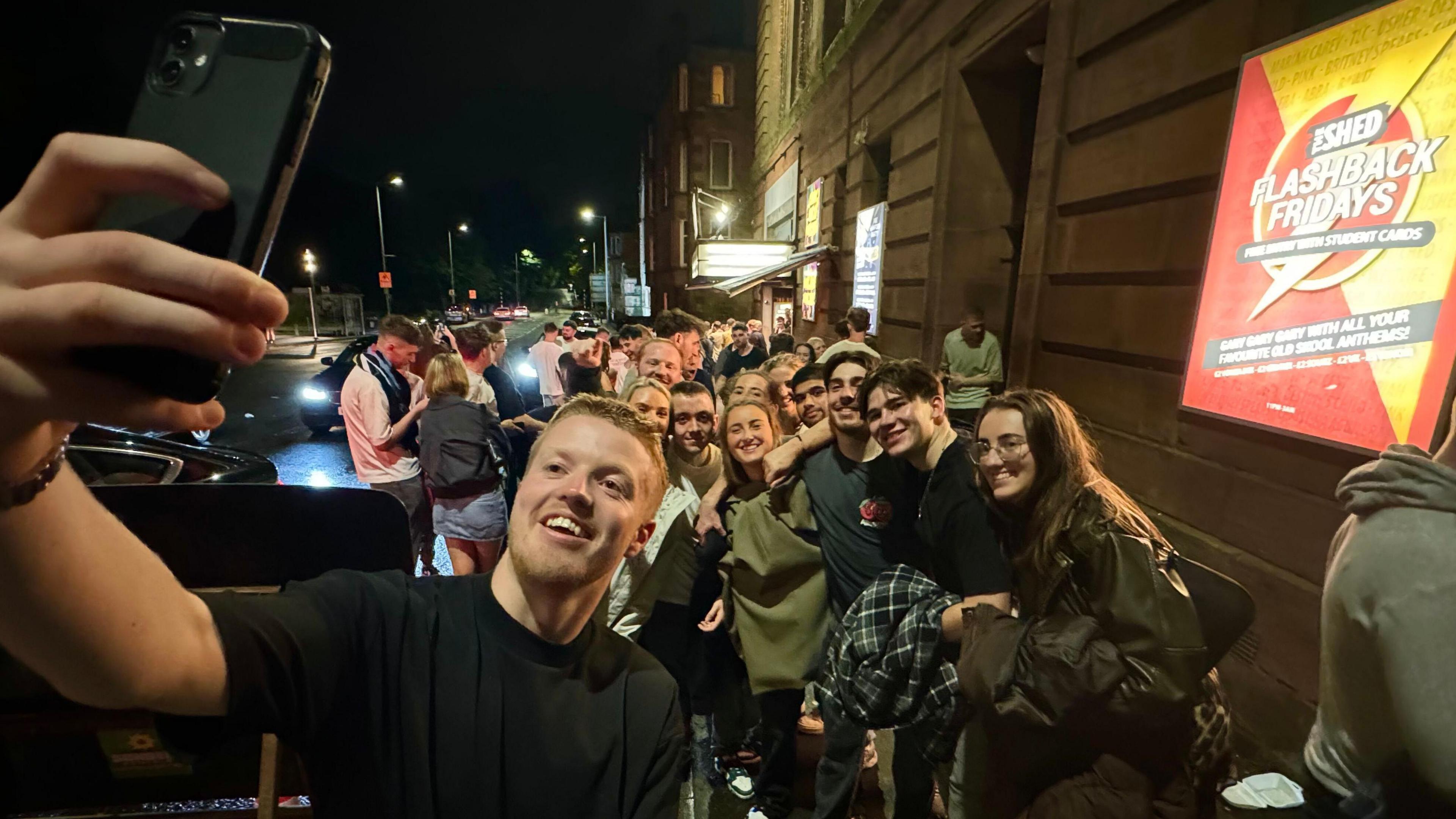
Tickets for The Shed's final weekend were hard to come by
Back outside The Shed the crowd begins to thin out.
People try to find their mates, order chips and cheese and inevitably drop some on the ground.
Economics and demographics may change but some things never will.
It's evident people really will miss this place.
The Shed had an ongoing – often slightly bonkers – dialogue with its customers and fans on social media.
“Our biggest achievement will always be the army of Shed Babies that wouldn’t exist if it wasn’t for this institution” it told them on Instagram when announcing its closure.
A message tempting folk with tickets for the closing event carried just as much emotion: "It's not about the venue" it read, "it's about the people you grew up with here, so text your old crew and get the babysitter sorted."
There was an in-built admission there that the target audience may now be getting on a little, the demographics have shifted, but still the nostalgia about this place may last forever, at least in the Facebook comments.
“Fell down the stairs there back in the 90s” comments one man called Patrick.
“No-one noticed despite it being closing time except the wee guy selling a Daily Record… Bought his silence.”